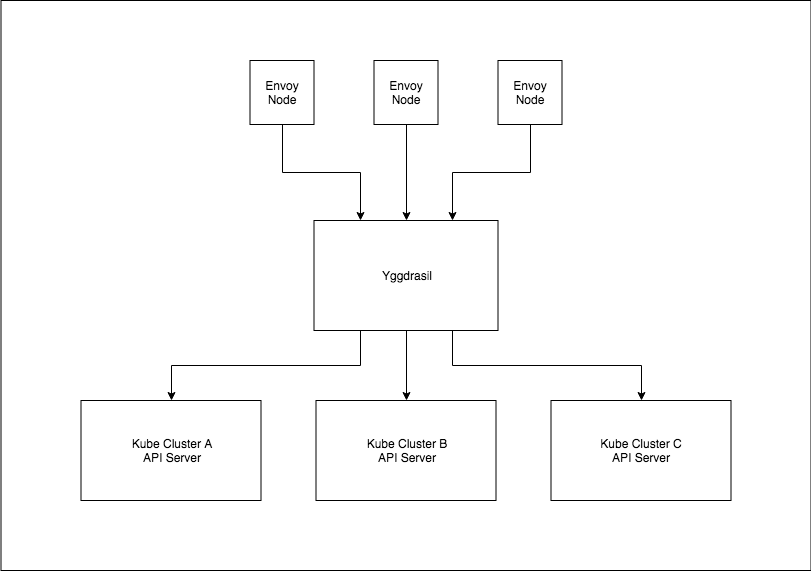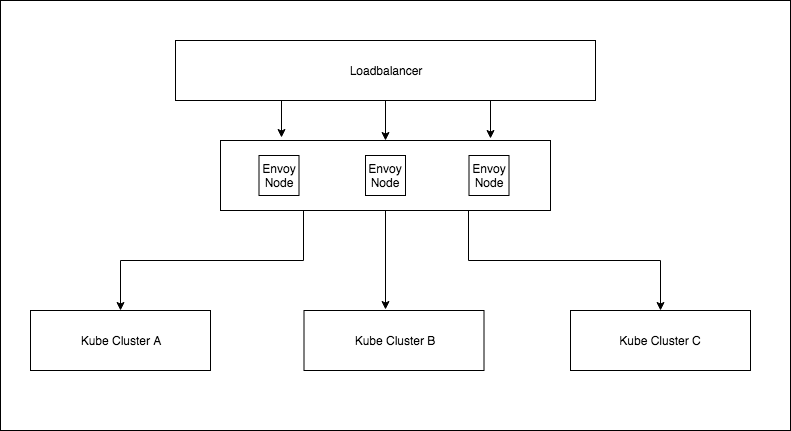uswitch / Yggdrasil
Programming Languages
Labels
Projects that are alternatives of or similar to Yggdrasil
Yggdrasil
Yggdrasil is an Envoy control plane that configures listeners and clusters based off Kubernetes ingresses from multiple Kube Clusters. This allows you to have an envoy cluster acting as a mutli-cluster loadbalancer for Kubernetes. This was something we needed as we wanted our apps to be highly available in the event of a cluster outage but did not want the solution to live inside of Kubernetes itself.
Note: Currently we support version 1.12.x of Envoy.
Note: Yggdrasil now uses Go modules to handle dependencies.
Usage
Yggdrasil will watch all Ingresses in each Kubernetes Cluster that you give it via the Kubeconfig flag. Any ingresses that match any of the ingress classes that you have specified will have a listener and cluster created that listens on the same Host as the Host defined in the Ingress object. If you have multiple clusters Yggdrasil will create a cluster address for each Kubernetes cluster your Ingress is in, the address is the address of the ingress loadbalancer.
Joseph Irving has published a blog post which describes our need for and use of Yggdrasil at Uswitch.
Setup
Please see the Getting Started guide for a walkthrough of setting up a simple HTTP service with Yggdrasil and envoy.
The basic setup is to have a cluster of envoy nodes which connect to Yggdrasil via GRPC and get given dynamic listeners and clusters from it. Yggdrasil is set up to talk to each Kubernetes api where it will watch the ingresses for any that are using the ingress class it's watching for.
Your envoy nodes only need a very minimal config where they are simply set up to get dynamic clusters and listeners from Yggdrasil. Example envoy config:
admin:
access_log_path: /tmp/admin_access.log
address:
socket_address: { address: 0.0.0.0, port_value: 9901 }
dynamic_resources:
lds_config:
api_config_source:
api_type: GRPC
grpc_services:
envoy_grpc:
cluster_name: xds_cluster
cds_config:
api_config_source:
api_type: GRPC
grpc_services:
envoy_grpc:
cluster_name: xds_cluster
static_resources:
clusters:
- name: xds_cluster
connect_timeout: 0.25s
type: STATIC
lb_policy: ROUND_ROBIN
http2_protocol_options: {}
hosts: [{ socket_address: { address: yggdrasil, port_value: 8080 }}]
Your ingress set up then looks like this:
Where the envoy nodes are loadbalancing between each cluster for a given ingress.
Health Check
Yggdrasil always configures a path on your Envoy nodes at /yggdrasil/status, this can be used to health check your envoy nodes, it will only return 200 if your nodes have started and been configured by Yggdrasil.
Annotations
Yggdrasil allows for some customisation of the route and cluster config per Ingress through the annotations below.
| Name | type |
|---|---|
| yggdrasil.uswitch.com/healthcheck-path | string |
| yggdrasil.uswitch.com/timeout | duration |
Health Check Path
Specifies a path to configure a HTTP health check to. Envoy will not route to clusters that fail health checks.
Timeout
Allows for adjusting the timeout in envoy. Currently this will set the following timeouts to this value:
Example
Below is an example of an ingress with some of the annotations specified
apiVersion: extensions/v1beta1
kind: Ingress
metadata:
name: example-com
namespace: default
annotations:
yggdrasil.uswitch.com/healthcheck-path: /healthz
yggdrasil.uswitch.com/timeout: 30s
spec:
rules:
- host: example.com
http:
paths:
- backend:
serviceName: example
servicePort: 80
Configuration
Yggdrasil can be configured using a config file e.g:
{
"nodeName": "foo",
"ingressClasses": ["multi-cluster", "multi-cluster-staging"],
"certificates": [
{
"hosts": ["*.api.com"],
"cert": "path/to/cert",
"key": "path/to/key"
}
],
"clusters": [
{
"token": "xxxxxxxxxxxxxxxx",
"apiServer": "https://cluster1.api.com",
"ca": "pathto/cluster1/ca"
},
{
"tokenPath": "/path/to/a/token",
"apiServer": "https://cluster2.api.com",
"ca": "pathto/cluster2/ca"
}
]
}
The list of certificates will be loaded by Yggdrasil and served to the Envoy nodes by inlining the key pairs. These will then be used to group the ingress into different filter chains, split using hosts.
nodeName is the same node-name that you start your envoy nodes with.
The ingressClasses is a list of ingress classes that yggdrasil will watch for.
Each cluster represents a different Kubernetes cluster with the token being a service account token for that cluster. ca is the Path to the ca certificate for that cluster.
Metrics
Yggdrasil has a number of Go, gRPC, Prometheus, and Yggdrasil-specific metrics built in which can be reached by cURLing the /metrics path at the health API address/port (default: 8081). See Flags for more information on configuring the health API address/port.
The Yggdrasil-specific metrics which are available from the API are:
| Name | Description | Type |
|---|---|---|
| yggdrasil_cluster_updates | Number of times the clusters have been updated | counter |
| yggdrasil_clusters | Total number of clusters generated | gauge |
| yggdrasil_ingresses | Total number of matching ingress objects | gauge |
| yggdrasil_listener_updates | Number of times the listener has been updated | counter |
| yggdrasil_virtual_hosts | Total number of virtual hosts generated | gauge |
Flags
--address string yggdrasil envoy control plane listen address (default "0.0.0.0:8080")
--ca string trustedCA
--cert string certfile
--config string config file
--debug Log at debug level
--envoy-port uint32 port by the envoy proxy to accept incoming connections (default 10000)
--health-address string yggdrasil health API listen address (default "0.0.0.0:8081")
-h, --help help for yggdrasil
--host-selection-retry-attempts int Number of host selection retry attempts. Set to value >=0 to enable (default -1)
--ingress-classes strings Ingress classes to watch
--key string keyfile
--kube-config stringArray Path to kube config
--max-ejection-percentage int32 maximal percentage of hosts ejected via outlier detection. Set to >=0 to activate outlier detection in envoy. (default -1)
--node-name string envoy node name
--upstream-healthcheck-healthy uint32 number of successful healthchecks before the backend is considered healthy (default 3)
--upstream-healthcheck-interval duration duration of the upstream health check interval (default 10s)
--upstream-healthcheck-timeout duration timeout of the upstream healthchecks (default 5s)
--upstream-healthcheck-unhealthy uint32 number of failed healthchecks before the backend is considered unhealthy (default 3)
--upstream-port uint32 port used to connect to the upstream ingresses (default 443)


